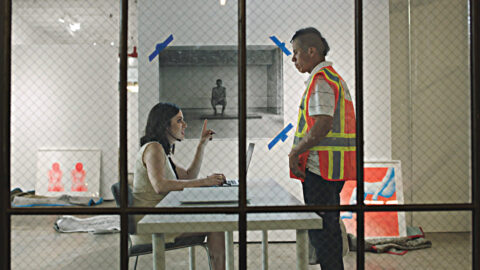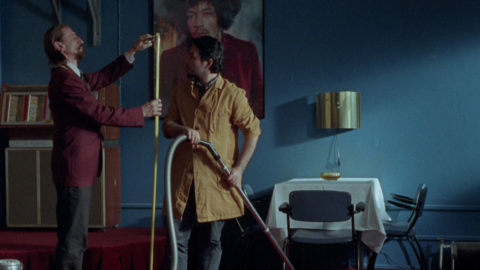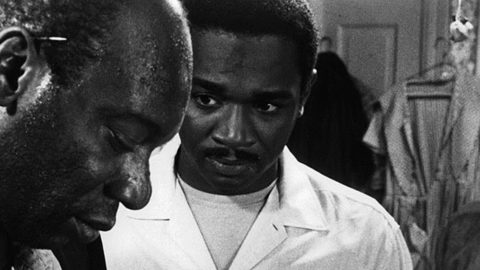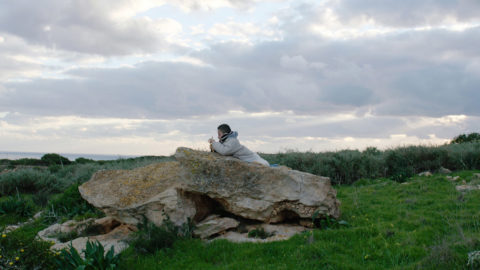Interview: Jim McKay
Jim McKay made two defining New York independent film features, Girl Talk (1996) and Our Song (2000), both focused on high-school girls in Brooklyn. He followed with two made-for-television features about adults at work, Everyday People (2004) and Angel Rodriguez (2005). After that, he spent about a decade working in high-end series TV. Now he’s back to low-budget feature filmmaking with En el Séptimo Día (On the Seventh Day), which focuses on a Mexican restaurant worker, who is torn between the demands of his job and being the mainstay of his Sunset Park futbol team, whose success rests with him being able to play in the big game on Sunday (hence the film’s title).
This interview took place on June 4, 2018, prior to the announcement by the current administration of its “zero tolerance” immigration policy. Had McKay and I talked a few weeks later, our conversation might have had another dimension.
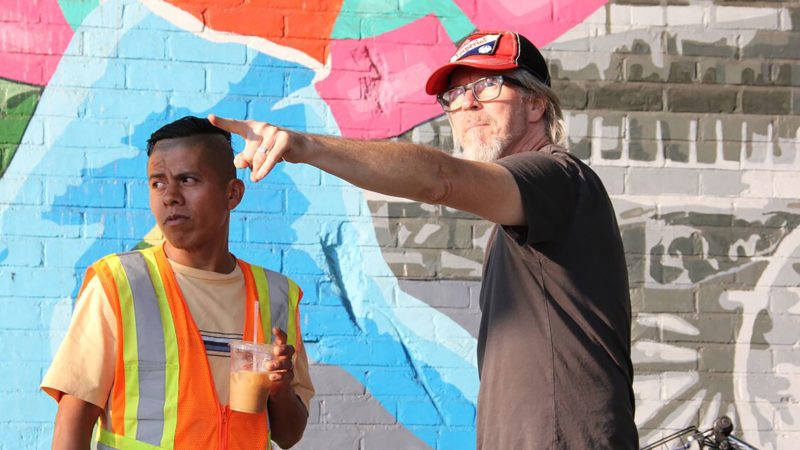
You’ve been working in television for over a decade. What made you come back to Brooklyn to make a film that is much in the vein of your early films? Did you still have a place in Brooklyn?
I never moved anywhere. And I’ve done mostly TV work here as well. I traveled for certain shows but mostly I stayed here and worked. I never lived in Los Angeles. My intention was always to do some TV shows and then make a movie, and make some TV shows and then make a movie… I underestimated the degree to which I would get wrapped up in it. I also started a family, and I’m not a multitasker—I don’t have five scripts I’m working on at one time, I’m a one-idea-at-a-time person, and television directing is exhausting. It’s absolutely physically and mentally exhausting. Even though you work for three or four weeks and you’re done with the show, it’s not like I can go home the next day and just start working. I go home and just do nothing for a week and regenerate and then pay my bills. And do my fathering again because I haven’t done that for a week.
And so your partner told you it’s time to make a movie?
Yes. Hannah Weyer. She co-wrote Angel Rodriguez. She was my script doctor for many years, and then she ended up writing a novel and left the film thing. But I’ve always wanted to make a movie that someone else paid for and that had resources. I’ve never necessarily wanted to make movies with known actors in them or stars—I wouldn’t say no necessarily, but that’s not been my goal. I would love to have the money, but the ideas that I come up with are not those ideas in this world. They’re not “castable.” I spent two or three years trying to make a film where the lead actor was a kind of well-known artist. And I just couldn’t do it. I couldn’t find the person who would bring in the money for the movie, and I’ve watched other filmmakers I know go through that, and I just don’t want to go through that process.
What kind of money are you talking about?
We had in the hundreds of thousands. I could’ve done it for $4 million probably. Right now if you make a union film in New York, it’s very difficult to make it for anything under $2 million, and that’s really stretching it. When I wrote [En el Séptimo Día], it had a connection in my mind with Our Song in that it was specific to a neighborhood and the characters were not your everyday leads. I was thinking about it as a brother to that movie in a way. In fact, at the beginning of Our Song it says something like “Summer, 1999. Crown Heights, Brooklyn” and I did that at the beginning of this film as a little nod to that. I tried to find outside money for this movie, and I guess my expectations are not realistic. I’ve been out of the film scene for a while, so I think I just thought, “Oh, someone’s going to want to invest something in this.” We got a couple of very key investments, but a lot of it was self-financed and that’s okay. That’s what I was saving money for, for the last 10 years, so I’m happy I did it.
People who are looking to make money making films raise their eyebrows that it’s mostly in Spanish, that obviously the cast are non-actors who are acting for the first time, and that the subject is largely undocumented restaurant workers in New York City. I would think, “Wow, that’s a great subject.”
It’s funny because Girls Town was almost completely self-financed and Our Song was not that different. They were both shot and edited for somewhere around $100,000. They were tiny movies, both of which sold and made their money back. Girls Town made some money actually because we were at the right place at the right time and got some soundtrack deal that brought in a lot of money. But on Our Song, the sale paid for finishing it, blowing it up, and releasing it, and everybody got reimbursed.
And Kerry Washington got a career.
That’s right. For me, if you get your money back, that’s a good investment. So [with En el Séptimo Día] I thought, “Well, we’re not going to lose money on this film. Someone should go for it just to be involved with it.”
I never saw Everyday People, the one you made after Our Song.
Both Everyday People and Angel Rodriguez are HBO Films, and they were original films—I wrote and directed them. It was during the period when they made the Gus Van Sant film Last Days, and also Joshua Marston’s Maria Full of Grace, Patricia Cardoso’s Real Women Have Curves, and Shari Springer Berman and Robert Pulcini’s American Splendor.
And Everyday People has a similar restaurant setting.
It was cast with real actors, and it was developed in an improv workshop situation, which was nice. I think it’s the strongest of all four of the films. The last time I saw it, I really enjoyed it.
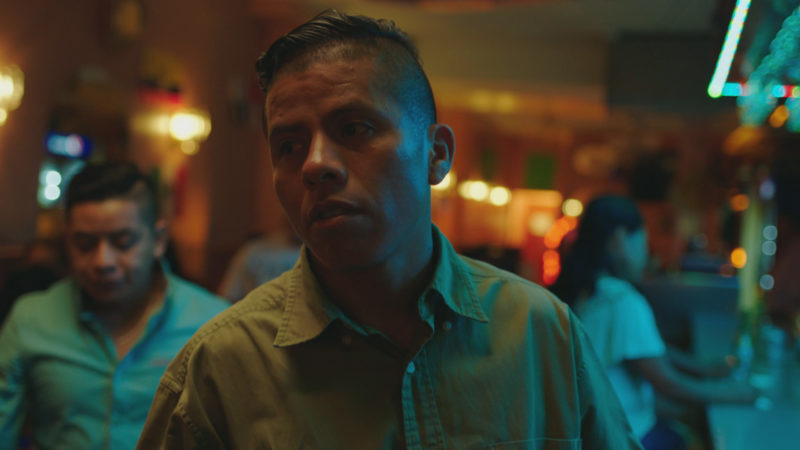
The cast of En el Séptimo Día were not professional actors. How did you find them?
We went on the street in Sunset Park mostly. We were in Jackson Heights a little bit and we went to East Harlem a little bit, but for the most part, because it took place in Sunset Park, I thought let’s start there. It does have a huge Mexican community, from Puebla in particular, and my goal was to have Pueblans in the cast. I think five or six of our main guys are from Puebla. We had little flyers, and we brought people in for interviews and open calls over the course of about six months. In a lot of ways the auditions were the rehearsals and a little bit of acting school too. We didn’t have many rehearsals before the film. It was so hard to get all the actors together, because they all work full-time jobs, six days a week. I had to save my resources for getting them for the actual shoot. So we had a read-through of the script about a month and a half before we filmed. Then we might’ve rehearsed a couple things. By the time the auditions themselves were over, I knew that I liked what everybody was doing and that they had learned to take direction. I will say one thing, [Jafar] Panahi’s films have been some of the most inspiring to me.
I think his new film at Cannes [3 Faces] is his best.
Oh, great! I’m a big fan of his, and I don’t know Kiarostami’s work quite as much, but I was drawn to the aesthetic of non-actors or not-known actors—the rawness of that—and a very simple camera. I thought we were going to be making something a little bit like that. I thought my actors were going to be more stiff and a little more self-conscious, and I thought it would be nice. You’d watch it and you’d go, “Okay, is this real?” But truthfully when we started shooting, I realized, these guys are actually doing it and they take direction and they’re hitting marks. And they made scenes organic and it was so wonderful to see, but it also threw me off a little because the feel, the tone, of the film is actually now different, and because of that, they’ve actually got to be even better. Now that they’re acting, they’ve got to really act.
Are you bilingual?
I’m not. I can get away with very minor Spanish.
So you wrote the script in English and then it was translated?
It was translated and I had one producer who is from Mexico. Lindsey Cordero, our script supervisor, is from Venezuela. Both of our assistant directors are bilingual, born in America, but Puerto Rican parentage and Peruvian. My editor’s parents are Puerto Rican and Cuban, and he’s fluent and he lives in Sunset Park. We had three people from Spain: the production designer, the props master, and the costume designer. I knew that, for instance, for wardrobe, that person has to be fluent because we’re going to use a lot of their own clothes. And the production designer, we’re going to be using stuff from their apartments or the neighborhood, and everybody’s gotta be able to interact. It’s interesting because of the nuances—if you have a script supervisor from Venezuela but your actors are Mexican, there are a lot of differences.
I remember when Benicio del Toro was torn apart when he did Che, because he had the wrong Spanish accent.
I remember when we were shooting, Narcos had just come on, and the lead guy who plays a Colombian is a Brazilian who didn’t even speak Spanish. So everybody in the Latino community notice that, but I think they’re just so used to it that they accept it. You couldn’t do that with this movie. In fact, every once in a while, someone from El Salvador or Guatemala would come into the auditions, and it was tricky.
I had an acting coach a million years ago named Susan Batson, and I don’t think she speaks any other language but she had students from all over the world. And if they had a tough scene and their English was not great, she would have them do their scenes in their language. Then she would critique them for 30 minutes. That taught me that, yes, the words are important, and I wrote the script so the words are very important to me, but it’s freeing in another way to watch a scene and just be watching someone’s connection with someone. That’s also why we didn’t do a million close-ups and tried to let people just be in the same frame with one another—you’re looking at it in a different way. I’ve tried to learn Spanish a million times in my life and I’ve got a part of my brain that just won’t accept it. I remember my friend, Tom Gilroy, was in Ken Loach’s Land and Freedom, and they had actors from everywhere in Europe in that film, and Ken only spoke English. I figured, okay, there’s a way to do it.
Do any of the actors have the acting bug now? The lead actor is extraordinary, an amazing talent.
I think they would love to be in something else and I’m just trying to facilitate, trying to spread the word. There’s not a million opportunities out there, and it is tough if you’ve got a job. But I think they had a great time, and the guy who plays Elmer, Gilberto [Jimenez], his instincts are incredible and as a comedic actor he’s amazing. And the guy who plays Jesús, Abel Perez, he came so far. When we met him, he was loading groceries out of a van for a grocery store he worked at, and barely wanted to talk to us. He was worried that the boss would see he was talking to someone on the clock, but he had something there and he was so good. He’s got a confidence and a skill. In the Mexican film and television community, they could probably get a lot of work.
Exactly. And there is Mexican TV here.
Yeah, for sure.
Has this film been changed or recut in any way since it was at BAMcinemaFest last year?
A lot of the music was replaced because we had not cleared that music. The main title song is the same, and the crucial morning montage scene has the same big hits that we paid money for because we thought they were really important. All the kitchen music in the restaurant is different, but it’s the same exact movie.
There’s a big issue with immigration now, this whole “anchor baby” thing. When José, the central character, talks about going to Mexico and bringing his wife back so she can have their baby here, I wondered how nervous you were that it would make this movie about a political issue.
I wanted very badly to not portray all the characters as noble, long-suffering laborers who are exploited. I wanted to show the joy in their lives. But also one main overriding goal of the film is to show these characters to people who maybe have never actually spoken to any of these characters and get some insight into their lives, so that maybe people will look at the world in a different way and see themselves in the characters. José is the dream employee, he’s kind of the manager of the restaurant—but Jesús is not, Jesús is the guy who says “Fuck that, fuck the boss.” That’s a reality, and I wanted to make sure that was real. The idea that someone might do something “wrong” gives some people who want to condemn things something to condemn—but it also gives people something to relate to, because it shows this is a human being who isn’t just perfect.
When we had the read-through with Juan Carlos Ruiz, who plays the priest, we were talking about the film, and he says, “It’s interesting you put the thing about the so-called ‘anchor baby’ in there.” I said, “Yeah, is that a little…?” And he said, “No, that’s great—that’s real, that’s very real.” Now, it’s so much worse politically. Yes, this is such a tiny little film, but if someone is going to say, “See? You admit that’s what people do! They purposefully have kids!” well, good for them! That’s what the law allows right now, I know you want to change that law, you’re probably going to do it—and then we’re going to get power again and we’re going to change it back and hopefully change everything back. But I’m not going to deny the reality—I thought that was important. The other scene that was tricky was where they’re taking delight in the story about the guy who got chased by the police—the cotton candy vendor. And they’re having fun with the story, and then it ends them saying, “I hope he’s okay.”
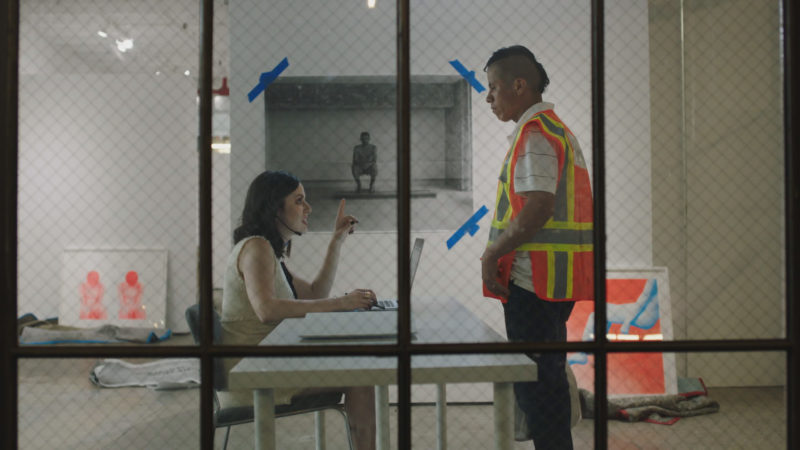
I was worried at the screening at BAMcinemaFest, because they were all there with their families. Who’s going to show up at this screening and haul them off somewhere?
Yeah, I worry for them so much—I’m not sure they are worrying for themselves 24 hours a day. There are people building a house right next door to us for the last three years, and there’s workers from all over the world working in all different shifts, and playing music, and telling stories all day, and laughing. Truthfully—this is also kind of saccharinely, stupidly, white of me or whatever—they have a lot more joy in their daily life actually than I do.
Tell me a little bit about the way in which this film is shot, particularly the exteriors and the kineticism of it. That could not have been done if you were still shooting film. En el Séptimo Día seems to me conceived for the freedom of a digital camera. Our Song and Girls Town had so much to do with how beautifully they were shot on film, by Jim Denault and Russell Lee Fine respectively. How much does that come into your conception?
Charlie Libin, who’s the director of cinematography, shot a lot of documentary stuff with Jonathan Demme, and he’s operated camera on a bunch of Demme features. He has very good instincts, and he was very drawn to this script. He had spent a lot of time in Mexico, had shot photographs there. It was a great pairing, and we talked about this early on: I kept saying I do not want to romanticize this, I don’t want it to be too beautiful. In all the homes of the actors and other people in the community, there are things from back home, but it’s also New York. It was funny because there were a number of times on the shoot I would say, “The lighting we’re doing right there, just be careful with that. Don’t make it too beautiful.” “Don’t worry, don’t worry, don’t worry.” And it became a joke. And the reason I say it was a beautiful collaboration is because the film looks beautiful.
It does. And you’re never conscious that it’s lit. Never.
And it barely is. He had a couple lights and he used them well. So he pushed back in a great way and I pushed in another way, and the meeting of it resulted in something really, really gorgeous. And that also might’ve come a little from my TV work because I was never a visual director from the very beginning. I was always a performance director and a words director, and I always had great DPs who I was working with who brought their skills to it and kept it simple but made it look good.
What’s great about this film is that it’s not generically Mexican or even generically New York. People haven’t seen Brooklyn look like that in a movie. They use the same Brooklyn locations in every single fucking movie.
And someone goes down the street and they turn the corner and you go, “That’s a different neighborhood, that’s not around that corner.” We actually tracked where the real restaurant was to where he lived, to where he was delivering, and we tried in the riding shots to never have him going on a street that he wouldn’t be on. A couple times we fudged it but…
The people you found on the street are amazing. I take it they were just there that day?
Yeah, we had some background actors for a couple scenes, but for the most part, we let everything be. One of the times when José arrives to the park with another delivery, in the foreground of the shot there’s this little Chinese kid with a water gun firing water like right toward the camera. And I’m sure when we were shooting I was like, “Go, get, roll, roll, this is great!” But I didn’t remember it until we’d cut the whole film! So the community became part of it, and that’s a great way to shoot if you can do it. And you can only do it if you’re small.
So what are you up to next?
I’m back to doing TV work so that I can pay my debts and bills, and I’ve got a couple of little ideas. I want to make another movie. I don’t want it to be another 10 years. I’ve seen a couple of Hong Sangsoo films recently, and I was inspired just by the story of how he works. Even though this was a small film, it was big. We had to schedule it, we had 20 people on the soccer field… I’d love to do something really small and intimate.
The Panahi film would be something to take a look at because it’s a car film: they go from the city to someplace far away, but the landscape is really important. It’s tiny, but in size it’s a very big film.
I look forward to it. I’ve always thought, oh, mumblecore, you get your friends, you shoot in your apartment… But I don’t wanna do the whole everybody-gets-together-for-Thanksgiving-and-we-make-a-film. But how do you do something, how do you just make stuff? ’Cause I don’t want to keep waiting. I’m getting old. I gotta make movies.
Amy Taubin is a contributing editor to Film Comment and Artforum.



